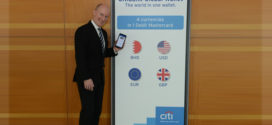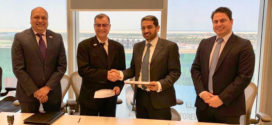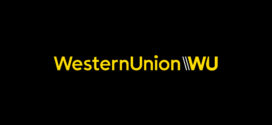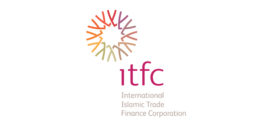H.E. Rasheed Mohammed Al Maraj, Governor of the Central Bank of Bahrain, inaugurates the 21st annual edition of the World Islamic Banking Conference (WIBC 2014). Baroness Sayeeda Warsi of the House of Lords delivers a special keynote address on the UK story of Islamic finance. Industry pioneer, Professor Datuk Rifaat Ahmed Abdel Karim engages in an onstage interview on the past, present and future of Islamic finance.
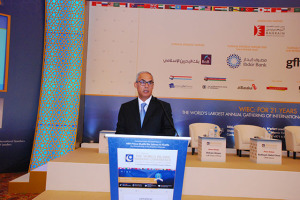
Kingdom of Bahrain: 2nd December 2014: The World Islamic Banking Conference (WIBC 2014) once again confirmed its position as the world’s premier, largest and most influential annual gathering of international Islamic finance leaders as the 21st annual edition of WIBC 2014 today witnessed a high-profile opening at the Gulf Convention Centre in the Kingdom of Bahrain.
Convened under the patronage of HRH Prince Khalifa Bin Salman Al Khalifa, the Prime Minister of the Kingdom of Bahrain and held with the official support of the Central Bank
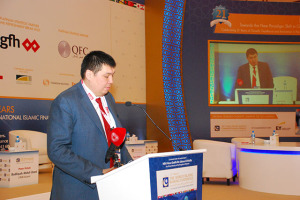
of Bahrain, the event was attended by over 1,300 industry leaders from over 50 countries representing over 300 international and regional organizations. A powerful line-up of more than 90 international speakers and industry thought leaders discussed critical issues that would enable Islamic finance to move towards a new growth paradigm in global financial markets.
The main WIBC conference was officially inaugurated today with an opening keynote address by H.E. Rasheed Mohammed Al Maraj, Governor of the Central Bank of Bahrain, while Baroness Sayeeda Warsi of the House of Lords, who has been a key driving force in the progress made by the UK in Islamic finance, delivered a special keynote address. Other keynote speakers included Nurlan Kussainov, Deputy Governor, National Bank of Kazakhstan; and Jaseem Ahmed, Secretary-General of the Islamic Financial Services Board (IFSB), who addressed key issues related to the strength, stability and enhancing international linkages between Islamic finance jurisdictions.
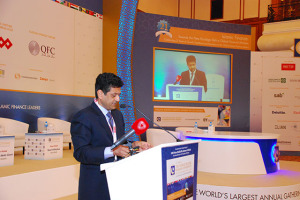
H.E. Rasheed Mohammed Al Maraj noted that: “The transformation of global financial markets in recent years has resulted in a new paradigm which has challenged banking institutions to re-think their business strategies and models. Given the continued rapid global expansion of the Islamic finance industry and the increasing inter-linkages between the key international jurisdictions, Islamic financial institutions are also experiencing a major phase of transformation. The Kingdom of Bahrain and the Central Bank of Bahrain (CBB) have been a first-mover in terms of its support for the development of the Islamic finance industry. Today, Bahrain is an internationally respected Islamic finance hub that continues to set new standards and initiatives to propel the industry forward in a stable and resilient manner.”
Another significant highlight of WIBC 2014 was the interactive face-to-face dialogue with Professor Datuk Rifaat Ahmed Abdel Karim, Chief Executive Officer, International Islamic Liquidity Management Corporation (IILM). One of the genuine pioneers in the industry who has held leadership positions with several of the international standard-setting bodies who have created the framework for Islamic finance to thrive, he shared his unique perspectives on the past, present and future of the industry during an onstage conversation.
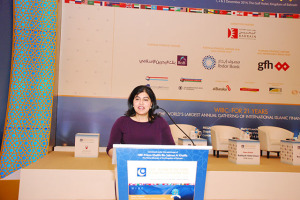
WIBC 2014 also featured the high profile Industry Leaders’ Power Debate comprising internationally respected CEOs and decision-makers from the key players in the industry. Discussions were led by Ashar Nazim, Partner, Head of Global Islamic Banking Centre, EY, and the panel included Basel Al-Haj-Issa, Chief Executive Officer, Ibdar Bank; Badlisyah Abdul Ghani, Chief Executive Officer, CIMB Islamic Bank; Hisham Alrayes, Chief Executive Officer, Gulf Finance House; Afaq Khan, Chief Executive Officer, Standard Chartered Saadiq; and Toby O’Connor, Chief Executive Officer of the Islamic Bank of Asia. The power debate session analysed what changes the Islamic finance industry must undergo in order to successfully adapt to a new global paradigm.
Speaking at the Power Debate session, Badlisyah Abdul Ghani reinforced the importance of building international linkages: “With the growing internationalisation of the Islamic finance industry, it has become increasingly vital for the key Islamic finance markets to build stronger relationships with each other as well as to create in-roads for business networking opportunities and cross-regional transactions.”
Toby O’Connor further underlined the need for global connectivity: “As Islamic finance continues to expand its geographic reach and depth, it is encouraging to see new opportunities for the industry to participate in international transactions across jurisdictions to help foster new business relationships between the key growth markets for Islamic finance.”
WIBC 2014 was indeed a truly international gathering as the ‘The World Comes to WIBC Initiative’ convened official delegations representing exciting jurisdictions for Islamic finance including Luxembourg, the United Kingdom, Bahrain and Azerbaijan; while the UK Country Interface was inaugurated by HMA Iain Lindsay OBE, British Ambassador to Bahrain.
In addition, the eagerly awaited 2014/15 edition of the World Islamic Banking Competitiveness Report was also launched at a specially convened session at the conference. Developed in collaboration with EY, the Report titled “Participation Banking 2.0” was presented by Abid Shakeel, Advisory Financial Services, EY and Noman Mubashir, MENA Advisory Services, EY. This year’s Competitiveness Report focused on key industry issues such as: The implications of the mainstreaming of Islamic finance in core markets challenging boards and CEOs to take a long, hard look at their brand positioning and operating models; and are the Participation banks ready to transform as they move away from the Islamic label?
Speaking to the media present at the event, David McLean, Chief Executive of the World Islamic Banking Conference, said that “From our starting position of just over 120 pioneering delegates and a handful of speakers at the very first WIBC in 1994, we strive to ensure that the conference keeps pace with the evolution of the global Islamic finance industry and year after year, put together a stimulating multi-faceted programme that addresses the challenges in the international Islamic financial markets and provides a platform to support growth, excellence and innovation in the global Islamic finance industry.”
Commenting on their participation in WIBC 2014, Mohammed Hassan, Acting CEO of Bahrain Islamic Bank said that “Islamic finance has a growing importance in the global financial markets as the industry continues to develop new opportunities both in its traditional core markets of the Middle East and SE Asia as well continuing to build momentum in new emerging markets such as the UK, Europe and the Far East. The 21st Annual World Islamic Banking Conference (WIBC 2014) has provided an important showcase to help drive the industry forward at a global level.”
The three day event began yesterday with a pre-conference seminar on Islamic capital and money markets hosted by the International Islamic Financial Market (IIFM) and WIBC 2014 will continue on Wednesday the 3rd of December featuring in-depth sessions on the practical frameworks to ensure the stability and success of Islamic finance. Tomorrow will also see the launch of the Thomson Reuters Zawya Sukuk Report and special session led by CIBAFI covering the practitioner’s perspective on strategic options for Islamic banks in response to Basel III requirements.
 Cash And Trade Magazine For Cash and Trade professionals in the Middle East
Cash And Trade Magazine For Cash and Trade professionals in the Middle East

